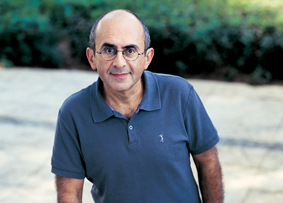
Archimedes reportedly shouted: “Eureka!” from his bath when he realized that a sinking object displaces a mass of water equal to its weight (as opposed to an equal volume of water). Ever since, the concept of specific gravity, known to schoolchildren and physicists alike, has been a cornerstone of our understanding of the physical world. But a new aspect of this basic law of physics, one that Archimedes never saw, has now been revealed.
Prof. Gregory Falkovich, Head of the Physics of Complex Systems Department, has been with the Weizmann Institute since moving to Israel from the former Soviet Union 14 years ago. He found that different types of very small objects floating on an inclined water surface move either upward or downward, depending on whether or not they “love” the water. The explanation: A water-loving, or hydrophilic, material displaces more water, by weight, than its own mass, and the resulting imbalance causes it to be carried upward. In contrast, hydrophobic - water-hating - materials displace less water than their weight, and these materials gradually move down the slope.
This surprising new spin on one of the most basic laws of physics was discovered when Prof. Falkovich and Dr. Sergei Lukaschuk of the University of Hull, England, were observing the movements of small beads floating on a standing wave. A standing wave does not really stand, but the water’s movements - up, down, forward and backward - cancel each other out, so that the average movement is zero. In this situation, anything floating on the wave should stay in one place. But the two scientists noted that tiny Teflon beads, which are “water-haters,” moved down the wave, while small, water-loving glass beads advanced up the wave. These findings may help explain, among other things, how oil droplets or pieces of trash form clumps in the ocean.
Falkovich: “Revealing a new facet of a basic law of physics is an event that doesn’t happen every day. In a sense, I feel as though I’ve had the privilege of crossing the time barrier and talking to Archimedes, one of the founding fathers of physics.”
Prof. Gregory Falkovich’s research is supported by the Gabriel Alhadeff Research Fund and the Edward D. and Anna Mitchell Family Foundation.
